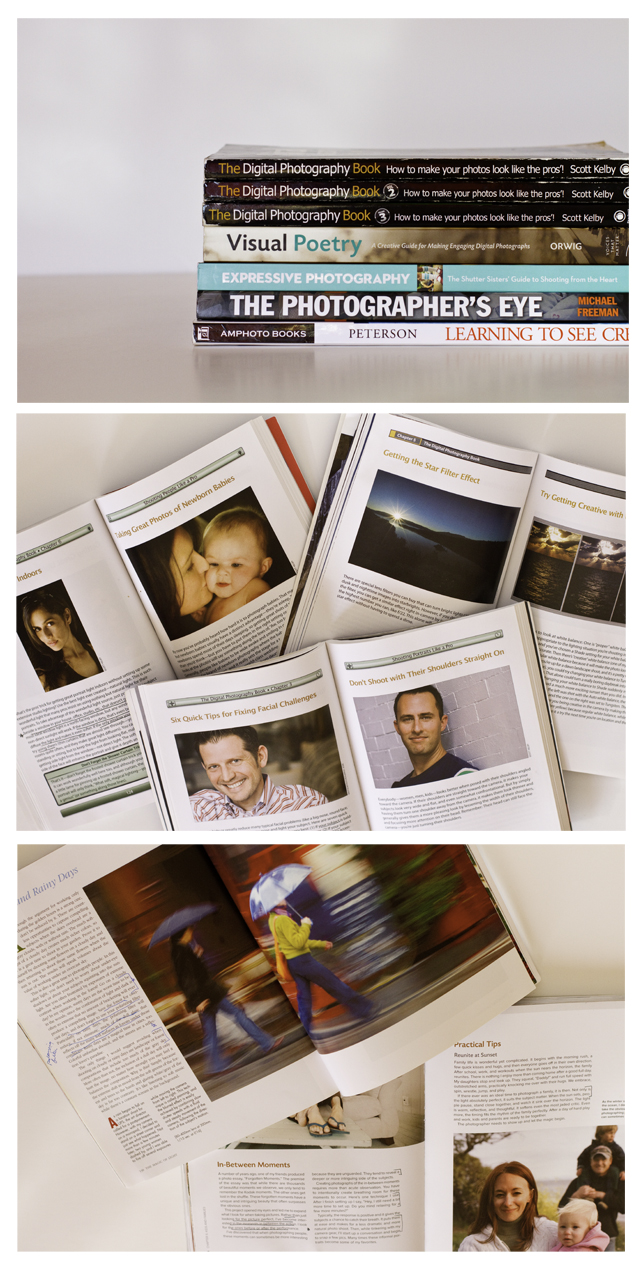
(In the second photo from the top, all books shown are part of Scott Kelby's Digital Photography Boxed Set, Volumes 1, 2, and 3
In the last few months, I've had a few emails and questions about photography and cameras. So I thought I'd write a post, which is always a little nerve racking as I'm self-taught. I started focusing on photography as a hobby about 3 years ago when my husband bought me my first SLR camera for Christmas (Canon EOS Rebel T2i 18 MP CMOS APS-C Digital SLR Camera with 3.0-Inch LCD and EF-S 18-55mm f/3.5-5.6 IS Lens
THE BASICS
If you're totally new to photography, the first thing you need to do is learn (by heart, just like a language) all about aperture, shutter speed and ISO. This part isn't really fun, it's sort of like school, but if you want to take your camera off automatic (and if you don't, then you'll be pretty limited in what you do), you have to learn it. Plus you should know what every button on your camera does (yes, every button). I recommend buying a supplemental owner's manual, for the Rebel I recommend this book - The Canon EOS Digital Rebel XSi/450D Companion
After you learn the fundamentals, I recommend Scott Kelby's Digital Photography Boxed Set, Volumes 1, 2, and 3
COMPOSITION
I never attended an art class before I took up photography, so I knew nothing about composition. For example, I think I felt the ground move when I learned about the rule of thirds, I was so impressed. I found the book Learning to See Creatively: Design, Color & Composition in Photography (Updated Edition)
GENERAL POINTS AND TIPS
For general points and tips, I really liked Chris Orwig's Visual Poetry: A Creative Guide for Making Engaging Digital Photographs
Regarding inspiration, I think the best thing you can do is to open a flickr account and find other photographers who inspire you. Visit their blogs, visit their websites. Study them. Try copying their style for awhile. Look for photography exhibits in your area and visit them. Soak up as much as you can. For example, I have a great list of photography blogs on my blogroll, I look to these frequently and though they intimidate me, I still keep trying. Remember that you're a work in progress. One day you may take a great picture and it may be months before you take another great one. So be it. Tackle a 365 project. Make goals. Try harder. Even when you don't have your camera on you, think of the shot you would have taken. Frame it in your mind. I do this about 100 times a day. At least. Also, never miss an opportunity to take a great shot - so you're at a family reunion in bright sunlight at noon (the worst possible time for photos) and there's no shade in site and nobody is smiling - how can you make this work? Try.
ME
I shoot all my photos with a Canon EOS 7D 18 MP CMOS Digital SLR Camera with 3-inch LCD (Body Only)
Was this helpful? Please let me know. Obviously I'm still learning and growing, some days are better than others, so, again, take my advice with a grain of salt, this is just what has worked for me (so far).
No comments:
Post a Comment